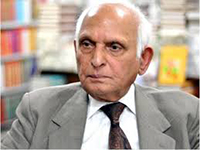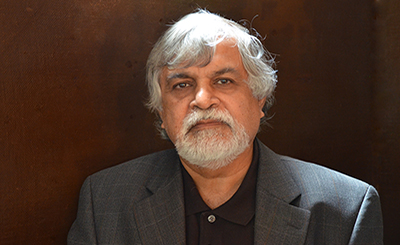
The next day he found himself back in the same lane knocking at the same door. Again, it was the same woman with a pair of most delicate feet who appeared in the doorway. He lowered his eyes involuntarily, stretched his hand with the begging bowl forward, received the alms and went on his way. Such was the precept he lived by. He had received alms at numerous door fronts and from numberless women, but never once had he raised his eyes to look at them squarely in the face. He knew that among the five senses, the eye was most prone to sinning. All that one sees around him is a web of maya, and the act of looking enmeshes him inevitably in this web and brings much grief. The eye then precipitates suffering. Better not look and be caught in this web and struck with grief. That’s why he never looked at the hand that gave alms, and he did not look today either. He didn’t look at who the almsgiver was, what was her face like, only a pair of dainty white feet flashed for a moment before his lowered eyes causing him to withdraw with a start. He came to this door one day, then the next, and then every day, because here, of all places, alms were offered with such reverence.
It was Basant Panchami day. Yellow saris floated everywhere in lanes and doorways. It looked like mustard buds had suddenly erupted into bloom, not in the fields but in these lanes, and it was not flowerbeds but doorways where marigolds gave off their warm, pungent smell.
Today, the bikhshu again came to the same door and clanged the chain. The one with dainty little feet appeared. Today, though, her feet were dyed with henna. His eyes lowered as usual, he watched her feet and marvelled how an application of henna could so adorn milky-white feet and how it changed their mien so radically. He kept staring at those delicate henna-stained feet for the longest time, quite forgetting to collect his bikhsha.
‘Bhikshu-ji! It is festival day . . . please hurry!’
This was the first time he was hearing her voice. As he raised the bowl, his eyes couldn’t resist rising along. And then he couldn’t lower them. What a charming form! Face a perfect moon, hair a gathering of dark clouds! Eyes as beautiful as a doe’s, neck like a peahen’s, her breasts were like pears, hips so rounded, a slender waist, her sari mustard yellow, and a red bindi painted above the center of her eyes. He lost his senses. He just watched her, his eyes riveted on this celestial figure. The beautiful woman dithered, and the platter of food fell off her hands.
On this sacred day, the bhikshu returned to his place with an empty bowl. He was very troubled: ‘Has moh caught up with me?’ He reflected long and hard, but couldn’t figure out, as if he had lost his ability to think clearly. He went to Ananda and said, ‘Prabhu, my mind is in a muddle.’
‘Why?’ Ananda looked at him with inquisitive eyes.
‘A woman.’
‘A woman?’
‘Yes, a woman.’ Sanjaya related the calamity that had struck him.
A surprised Ananda heard him out with wide-open eyes. Then he closed his eyes and contemplated in silence. After a while he opened them and said, ‘Friend, moh resides in alleys and doorways. And bhikshus, as a rule, don’t stay on in alleys or linger in doorways. They wander from lane to lane, from door to door, collecting bhiksha from a different place every day. But you, fool, you violated the rule, exactly the way Sunder Samudra did.’
‘What did Sunder Samudra do?’
‘You don’t know what Sunder Samudra did?’
‘No, Lord, I don’t.’
And it was thus that Ananda told him the story of Sunder Samudra:
The Story of Sunder Samudra
It was Janmashtami day. The weather was gorgeous, the time full of joys, and the melodious pattering of August rains so refreshing. A solitary old couple sat in their substantial haveli crying their hearts out. A dancing girl who was passing by was taken by surprise. She inquired, ‘What calamity has struck you that you are crying so bitterly on Janmashtami day when every man, woman and child is celebrating?’
‘Ah! the festivities of Janmashtami are not for us anymore,’ the old woman replied with immense sorrow, ‘and neither are those of Holi and Diwali. We have lost our son. Every moment we are reminded of him and keep weeping over our loss.’
‘You have lost your son?’
‘Yes, he was our only son and he left us, plunging our world in utter darkness.’
‘But why?’
‘One day, Lord Buddha happened to pass through this town. His preaching so affected our son that he was completely taken. Where before he was given to the ways of a pleasure-loving youth, he now had his head shaved, slipped into saffron robes, and followed the precepts of Shakyamuni.’
‘What is your son’s name?’
‘Sunder Samudra.’
‘Don’t worry, I’ll bring him back.’
‘Woman, you don’t know what you are talking about! Who has ever returned after joining the host of Shakyamuni?’
The dancing girl was annoyed and retorted in a huff, ‘He may well be the muni of his time, but I am no less the kanchani of mine.’
She left, made some enquiries about Shakyamuni’s current sojourn and about the town where his bhikshus made their begging rounds. She went to that town and found herself an elegant haveli to live in.
Sunder Samudra used to go to that town every day to beg for food, wandering sometimes in this and sometimes in that lane. One day he happened to walk into the lane of the singing girl and stopped at her door. She was, of course, lying in wait for him. She personally came to the door with a full plate of food. She talked to him with such cunning and offered alms so sweetly that Sunder Samudra ended up in the same lane and at the same door again the next day. He became so attached to it that he stopped knocking at other doors. He would go there every day and return after receiving his bowlful of alms.
One day the wily dancer asked him, ‘Bhikshu-ji, if your rules permit, wouldn’t you perhaps care to stay and eat here today? Oh, how your blessed presence would brighten up my place!’
Sunder Samudra thought for a while, then said to himself, ‘Tathagata never turned down anyone’s request, not even when some clod gave him meat to eat. He didn’t refuse and ate it. Well, I too must adopt this rule.’
And thus, Sunder Samudra ate his food in the dancer’s doorway. The cunning woman made the same request of him the following day and he accepted it. From that day forward, he began to eat his food in her doorway.
Next the dancer sweet talked the street urchins into making a lot of noise and raising clouds of dust in the lane just when bhikshu-ji was having his repast in the deorhi. ‘And listen,’ she said, ‘pay no attention to however much I scold and yell at you.’
Come next day, the brats did just that. Much as the dancer yelled at them to stop, they let her reprimands enter one ear and go out the other.
The following day the dancer joined her hands in reverence before Sunder Samudra and begged him, ‘Prabhu-ji, the street urchins are pretty rowdy. They kick up so much dust that it spoils the food. I beseech you to please come inside and eat in peace.’
Sunder Samudra once again recalled the Buddha’s wont and accepted her offer without hesitation.
So now every day he went through the doorway straight inside the haveli to take his food, while the dancer stood in reverent attendance to serve him. She served him and revealed all the attributes of her graceful form. And what a form it was! Her face was fair and deeply suffused by a rich blush of rose, her luxuriant dark curls gathered in a braid that swayed like a serpent on her back, her eyebrows a pair of taught bows, her breasts round and firm, like a pair of half-ripe fruit, a thin waist, ample hips. Sunder Samudra felt a strange amorous stirring in his heart.
By sagacity Tathagata intuited the troubled thoughts of his bhikshu. In those days, he was lodging with his monks in Anantha Pandak’s garden on the outskirts of Sravasthi. When the monks gathered together to hear his sermon, Tathagata took his seat under the shade of a dense mango tree, assumed the cross-legged posture of meditation and closed his eyes. After a while he opened them and gazed at his monks. Finally, his intent look, full of understanding and knowledge, settled on Sunder Samudra. After some time, he asked, ‘Sunder Samudra, what ails thee?’
Sunder Samudra lowered his eyes and replied haltingly, ‘O Tathagata, it is desire.’
Tathagata let his gaze linger on him awhile and then he said, ‘O bhikshus, attachment is the mother of suffering. Desire brings nothing but distress to man. Far better than a lustful man were those monkeys who understood and avoided it and lived a life of peace and contentment.’
The monks asked, ‘O Tathagata, who were those righteous monkeys and where did they live?’
‘Haven’t you heard the story of righteous monkeys?’
The Jataka of Righteous Monkeys
Many, many years ago, far away from the human habitation, there lived a community of monkeys in the foothills of the Himalayas. Once, by chance, a hunter wandered in the monkeys’ area. By some clever stratagem he managed to catch one of their tribe, brought him over to Banaras and gifted him to the king. The monkey served the king so well that the king was very pleased and set him free.
When the monkey returned to his habitation, the entire community gathered around him and asked, ‘O bandhu, where had you ensconced for all this time?’
‘My bandhus, among the humans.’
‘Among the humans? … Oh? … All right, tell us how did you find humans?’
‘Don’t ask that, bandhus. Don’t.’
‘But we will.’
‘Well then, if that is your wish, listen: like us, humans are also males and females. But there is a difference. The male has long hair on his chin and the female has very large breasts, so large that they hang loosely. The one with dangling breasts traps the ones with long hair on their chain in webs of amorous desire and makes them suffer.’
The rest of the monkeys plugged their ears with fingers and cried, ‘Enough, bandhu, that’s enough!’
Then they got up from the hilltop saying, ‘We must leave this place where we have come to hear about evil deeds.’
Ending his account of the Jataka Tathagata fell into silence. After some time, he said, ‘Bhikshus, the monkey who narrated the story was none other than myself, and the monkeys who heard it are bhikshus of my flock today.’
A bhikshu was surprised and asked, ‘O Tathagata, how could woman make man suffer when he is strong and she weak?’
A smile appeared on Tathagata’s lips. ‘O simple-minded bhikshus,’ he said, ‘What if she is weaker? She more than makes up for her weakness by her cunning. She can make a man disarm by her smarts. Haven’t you heard the jataka of the cunning princess?’
‘No, we haven’t.’
‘Well then, listen.’
The Jataka of the Cunning Princess
In a time long ago there lived a king in Banaras who journeyed to Taxila to acquire knowledge and became very learned and wise. He had a daughter. Afraid that she might go astray, he kept a close watch on her. Regardless of how a woman is kept locked behind seven doors, she is bound to find a way out and fall into bad ways. Despite the King’s unrelenting precautions, her eyes collided with those of a man of pleasure and they fell in love. However, the palace was so heavily guarded there seemed no possibility for the lovers to meet. The man took his maid into confidence and persuaded her to go to the palace. She did go and became the personal maid of the Princess. She looked out for the right moment to broach the subject of meeting. One day, as the maid was picking lice from the Princess’s hair, she wittingly scratched the latter’s head with her nails. The Princess was no novice, she knew what the scratching meant. ‘Aree, out with it,’ the Princess said, ‘what message has he sent?’
The maid took courage and gave her the message, ‘He is asking how might he meet you.’
‘Why, that’s not a big deal,’ the Princess said. ‘Tell him: a well-broken elephant, a dark cloud, a tender wrist.’
The maid left and gave the message to the lover. He got the drift of the Princess’s words. He trained an elephant and sought the help of a boy of tender age. When the rainy season came along, he picked an especially dark, cloudy night, mounted the elephant with the boy sitting next to him and went to the palace walls, waiting for the Princess to appear.
‘The rain is so heavenly! Maharaj,’ the Princess said to her father. ‘I’m going to bathe in this refreshing downpour.’
The King did his best to talk her out of it, but she remained adamant. She sauntered out in the rain for a shower and reached the edge of the parapet wall below which her lover was waiting on his elephant. The King, however, didn’t abandon his vigilance and followed her. When she started to take off her clothes, the King turned his face away but held on to her wrist. Pretending to remove her angiya, the princess freed her wrist for a few seconds and placed the boy’s wrist instead in the hand of her father. She jumped off the parapet wall on to the elephant and off the pair went.
It was too dark for the King to fathom what had transpired, more so because his face was turned away. His face still averted and the hand holding the boy’s wrist, he walked back and pushed him into the Princess’s attic chamber, fastening the door’s chain from outside.
Only in the morning did the King learn of the Princess’s elopement with her lover. Feeling utterly outdone, he sighed wearily, ‘Surveilling a woman is a veritable challenge. She will slip out even as you are holding her wrist.’
His narration over, Tathagata remained silent for a while and then said, ‘Bhikshus! Do you know who that King was? It was me, a king in my previous incarnation, and I had a daughter.’
He drifted off into silence again. Emerging from it, he said, sighing despairingly, ‘I could unravel the mysteries of nature, but not those of the woman species.’
Sunder Samudra was suddenly jolted as if out of a daze. He understood the wiles of the dancer and vowed to free himself of her beguiling charms, saying, to himself, ‘I will tell her today not to wait for me ever again.’
Determined, he went to her door. She received him warmly as before, ushered him inside and seated him on the veranda. But today, the street urchins, as per her bidding, stormed straight into the haveli and started making a terrible racket. The tart first yelled at them to stop, but when they didn’t, she pleaded with Sunder Samudra instead, ‘Bhikshu-ji, these brats are raising hell here and bothering you. Please come upstairs and have your meal in peace and quiet.’
Sunder Samudra hesitated at first, and then the thought crossed his mind that people were like children and one ought to grant them their wishes. Such, at any rate, was also the norm of Buddhism. This was going to be his last meal here after all. Come tomorrow, who knows where he might be and where this haveli. Just as well?
He got up and followed the dancer upstairs. As they climbed the stairs, he kept his eyes lowered, taking one step at a time and unmindful of her who was leading the way. But she would suddenly stop as though exhausted and needing to catch her breath, causing him to brush against a being as soft and insubstantial as a shadow.
Upstairs, she led Sunder Samudra into an elegantly prepared chamber and seated him on a soft, well-made bed, and sat down near him pretending to be tired from the exertion of climbing the stairs.
O my Bandhus, a woman knows all the shenanigans to seduce a man, and the dancer was adept in all of them. First, she took a lengthy yawn, stretching her naked arms above her head. Then overcome as if by shyness she smiled coyly and quickly lowered her arms, and gazing at her fingers began to pick her nails. She then took the edge of her sari between her teeth and blushed. For no reason at all, she giggled wildly and suddenly covered her face with her hands, speaking now shrilly, now in soft undertones. At first the harlot cowered and sat away from him but slowly began to edge closer — so close, indeed, that her body was touching his. She let the edge of her sari slide down her breasts but quickly pulled it back up, pulled the sari up to expose her thighs and let it slide down hurriedly. At one point, she yawned so vigorously that the tautness of her arched back caused her bra to snap and reveal her fulsome breasts. She withdrew, then brought her lips close to his and pulled away with a show of shyness and modesty.
O bandhus, that did it. Sunder Samudra was totally swept off his feet and felt turned-on. He forgot that he was a bhikshu. She was already sizzling with passion, and when she saw the signs of arousal in him, she let go of all restraint. That shameless creature, she hastily tore the last piece of clothing off her body and his. They hugged. They entwined.
Ananda became suddenly quiet. Sanjaya asked in anxious eagerness, ‘What happened then?’
‘What happened?’ Ananda laughed. ‘Well, Tathagata assumed his cross-legged posture to meditate and closed his eyes. Still he could vividly see what all that brazen coquette was doing to a bhikshu far from the garden in the loft of a haveli in Sravasthi. Just when their bodies were about to meld, Amitabha’s visage flashed in Sunder Samudra’s imagination. He instantly came to his senses and managed to pull himself just in time out of desire’s raging ocean.’
Ananda related the story and fell silent. For his part, Sanjaya was immersed in thought. ‘That, indeed, was an auspicious time when Tathagata lived among us!’ he said sighing wistfully to himself. ‘For then if an ignorant one allowed himself to be charmed by the antics of a seductress, he immediately disciplined him and brought him back to the right path.’ Then, after a pause, he added, ‘But who will protect me from the wiles of a woman?’
‘Listen, Sanjaya,’ Ananda said, ‘let me give you the same advice that Amitabha gave me. He said, “Ananda, you should become your own guiding light.”’
Sanjaya heard the advice and deliberated on it, and then he said to himself, ‘I will become my own guiding light.’
So, the next day, as he set out for the town with his begging bowl, he vowed to himself not to set foot in that lane. But no sooner had he entered the town than he noticed that the path he was on led to the same lane. Indeed, whichever path he took ended up in the dancer’s lane and at her door, or so he thought. Perplexed he stopped and stood still.
How small the otherwise sprawling Sravasthi seemed today. He had walked through its every lane and collected alms at each of its doors. But today it was a single lane and a single door that occupied his thoughts, where she stood waiting for him with a salver of food.
He let the image of the whole town sail through his mind and he wondered how alleys spread through it like an endless network, and how in each of their doorways women stood waiting to dole out alms. ‘Alleys, doorways, women — nothing but a web of maya!’ he concluded.
He was instantly reminded of the monkeys who had, on hearing about the seductive conduct of women folk, plugged their ears and abandoned their abode where this sinful matter was related.
‘I, too, must abandon this town,’ he decided. He turned his back on the town and set out for the forest.
Lanes and bylanes, doorways and women — all were left far behind Sanjaya who was now wandering in thick forests. Coming to an Ashoka tree in full bloom, he decided to stay awhile under its shade to meditate. It was springtime. Mustard fields had erupted into a dazzling expanse of yellow flowers, and the sweet smell of marigolds hung everywhere in the air. The branches of the Ashoka tree, laden with thick foliage and a plenitude of blossoms, were bending to embrace the earth with their glorious weight. He felt immensely pleased amidst such beauty. In astonishment he mumbled to himself, ‘O Lord, what maiden’s delicate feet have stumbled over this Ashoka that it has burst into such inflorescence!’
The memory of those lustrous white feet, tender and dyed with henna, flashed across his mind. Were those the feet that touched this Ashoka? He wondered. That beguiling beauty, decked out in her bright yellow sari, slowly began to emerge in his memory and completely took hold of his senses. A short while later, after returning to his senses, he admonished himself, ‘Oh, I’m falling into the trap of desire all over again!’ He quickly got up, saying, ‘A sinful thought crossed my mind under this tree. I must abandon this place right now.’
Sanjaya embarked again on a long, meandering track through the forests. Months passed, seasons spun along in succession, each with its distinct aura, its gaiety, its delight, but only managed to torment his soul the more. Whether it was mustard fields or mango trees in bloom, a humming, swaying black bee or a hovering butterfly, the doleful strains of a pained koel or the crock of a frog, the sweet smell of a champa or a bela—everything ruffled the tranquil surface of his memories. Every moment reminded him of what he had left behind, and her beautiful image came flooding back to overwhelm his mind.
Sanjaya puzzled over whether each path of each forest didn’t lead to her door. After brooding for a long time, he concluded that the seasons were in cahoots with man’s five senses, which were like so many entryways to the abode of suffering. Any one of them could ensnare a man in the web of desire, as when he touched a soft petal, or heard a sweet melody, or just by the breath of a subtle fragrance that carried him away, or the stunning beauty of a certain color that took him in. The knowledge that in the end every season brought pain made him infinitely gloomy, and his tormented soul asked, ‘The town has its alleys, the forest its seasons—how might I escape the talons of desire?’
He was still immersed in these thoughts when fall settled in. The days felt full of sadness. He watched wistfully how with every gust of wind trees dropped their lifeless leaves which then fluttered around him in great profusion. ‘Is the fall telling me something?’—he wondered. He plunged back into his thoughts, feeling the stirrings of disquietude in his heart as the memory of something slowly began to return. But it was memory of a different kind: it was the same season and a similar forest, Tathagata had come to stay there for his meditation during autumn. Dry yellow leaves were scattered around him. He stretched his hand and grabbed a fistful. And then he looked at Ananda and asked, ‘Ananda, have I gathered all the leaves of the forest—what do you think’?
Ananda replied after some hesitation, ‘O Tathagata, it is the fall season. Leaves have come down in such abundance that it is impossible to count.’
‘You spoke the truth,’ Tathagata said. ‘Yes, so many, and I have been able to pick only a handful. The same holds for truths. I have preached however many truths I’ve been able to lay my hands on. But, truths are far too many, like the leaves in autumn.’
The memory stunned Sanjaya, indeed so much that he froze on the spot, unable to move forward or backward. He sat down cross-legged, in a posture of meditation, under a dense peepal and gazed at the yellowed leaves as they came circling down the trees. Countless autumn leaves, countless truths. The sight of the leaves astonished him. Then his eyes slowly closed. ‘That which is outside me is also within me,’ he said to himself.
He remained in meditation with eyes closed. Heaven knows for how many days, how many ages. Finally, when he opened them, he realized that many seasons had passed and he was in the thick of autumn. His lap was filled with lifeless pale-yellow leaves. He was bathed in their saffron glow and his body was burning in the heat of the scorching sun. The shady peepal was now completely denuded of its dense foliage. He looked around. As far as the eye could see, the earth was covered with a blanket of desiccated yellow leaves and every tree in the forest stripped bare of verdure. He looked inside his serene heart and said to himself, ‘I too have shed all my desires.’ Adding a while later, ‘Whether it is basant, rains, or winter—all seasons are short-lived. Flowers wither, perfumes vanish in the air, branches dry up. Only autumn endures.’
A smile appeared on his lips, it was as if he had come upon a treasure trove of knowledge. He got up. His mind was perfectly at peace. ‘I have reached my goal,’ he said. ‘I must return now.’
Sanjaya had entered the forest bereft of his bowl and a heart full of disquietude. He now emerged from it with knowledge and a calmed heart.
Soon he found himself back in the town. Sravasthi was in the grip of festive excitement and gaiety at that hour, as though it was not a town but a flourishing garden, permeated by fragrant smells, with birds chirruping and beautiful women in colorful saris promenading along its paths.
Like a renouncer of all passion and desire, Sanjaya took this festive atmosphere in and for a moment felt the urge to stand in the middle of the town and admonish its dwellers: ‘O ignorant townsmen! Don’t let pleasure and revelry get the better of you. Don’t you see how flowers eventually wilt and wither away, fragrance dissipates, beauty loses its gloss, and freshness of youth wanes? The myriad seasons of beauty are all ephemeral. Only the autumn abides.’
But, how could he open his mouth. Hadn’t he forsworn all desire already? With lowered eyes, he walked through the lanes of Sravasthi. He didn’t raise his eyes to see the lane he was in or the door he was begging at. ‘Why should I look? A bhikshu’s business is with alms; why should I care where I received it, at which door and from whose hands?’ His lowered eyes fell on a woman’s feet and he was jolted. It was the same pair of soft white feet adorned with a wash of henna.
‘Could she be the same woman?’ He raised his eyes. Indeed, she was—the same, draped in her mustard-yellow sari, a red bindi blazing on her forehead, with a platter of food in hand. His eyes were transfixed on her and his feet were unable to move even one step forward or backward. It seemed numberless ages had passed in the space of that one instant, and across interminable cycles of rebirths, he felt, they both had stood facing each other—she in the same doorway and in the same manner, he gazing at her in wide-eyed astonishment.
Again, his mind was in turmoil and his soul struck with grief. The season was again beginning to change. Tender new shoots were sprouting on bare trees. Assailed by crushing doubt, he looked inside his heart and asked, ‘Could it be that a new leaf has suddenly sprung up within me too?’ Mystified, he asked himself again, ‘Where have I landed walking in the glow of my own light? What leaves are these that have unexpectedly wafted into my hands?’
Comments
*Comments will be moderated












